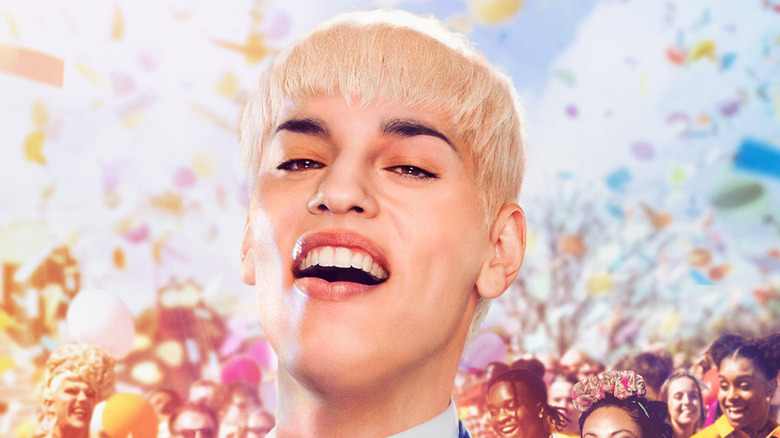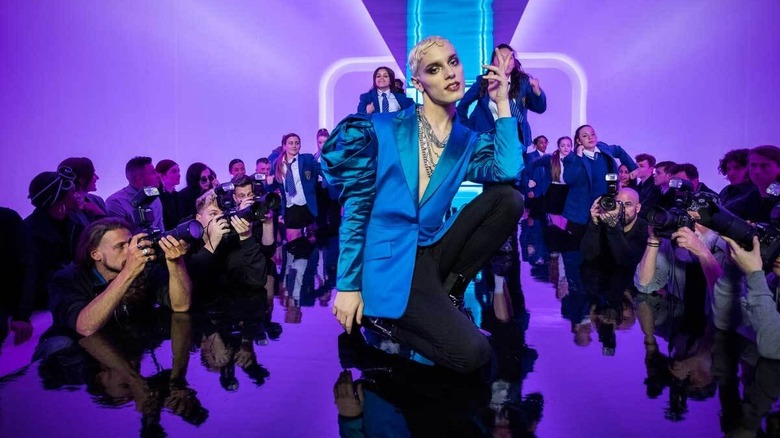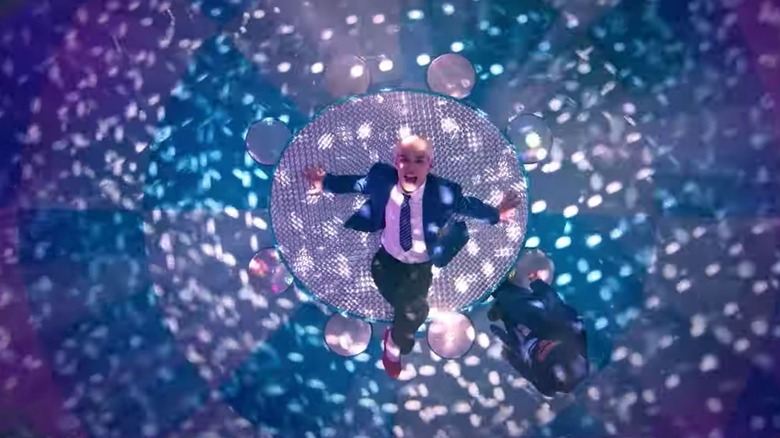Everybody's Talking About Jamie Review: Silence Is Golden
As a gay man who grew up in a working class neighborhood just 30 miles from where "Everybody's Talking About Jamie" is set, the most damning thing I can say about the movie adaptation of the hit stage musical is that it is not remotely aimed at me. This is the latest mainstream LGBTQ film more concerned with winning over straight allies than any queer audiences, its central tale of self-empowerment told with all the basic platitudes of a corporate Pride Month campaign. While watching director Jonathan Butterell's film it becomes apparent that, much like 2018's "Love Simon," this is a frequently cringeworthy attempt at representation primarily aimed at the people outside the marginalized groups it depicts, and is all the more embarrassing because of it. If you think the A in LGBTQIA stands for ally, this movie is for you.
This should have stayed onstage
Newcomer Max Harwood stars as Jamie New, a 16-year-old with no direction in life, nearing the end of his school years with no idea about what he wants to do next. One day, he has a lightbulb moment and realizes that his calling is becoming a drag queen — his mother (Sarah Lancashire) and best friend (Lauren Patel) are both supportive, and he's outspoken to the point that he couldn't care less about what any homophobic bullies at his school have to say about it. After meeting drag queen Loco Chanelle (an awful Richard E. Grant), he becomes convinced he has what it takes to follow in his footsteps, and has an even bigger plan to debut his new look: he's going to wear a dress to his school prom, something which attracts the ire of his quietly bigoted teacher Miss Hedge (Sharon Horgan). At home, things are far from rosy, with Jamie long estranged from his father (Ralph Ineson), a simple homophobe who wants nothing to do with him. But none of this matters, because Jamie knows he's going to be a sensation.
The film has been adapted from the stage production by Jonathan Butterell, who directed the show when it premiered in 2017 in Sheffield, the city where the musical is set. This is Butterell's feature directorial debut, and it very much shows, with poor decisions in the staging of almost every number in a presumed attempt to make it look more cinematic, which only make it look more like a clumsy music video. The criticism leveraged toward "In the Heights" earlier this year, that the amount of fast cutting during performances did a disservice to the choreography, is only amplified here, Butterell ignoring the original stage directions to repeatedly cut to different locations mid-song. The trick to a good musical adaptation is remembering what made it work onstage, and convincing the cinema audience that they too are witnessing a fantastical performance naturally unfolding in front of their very eyes. Only the realization of the infectious title song gets close to achieving that goal, with the other numbers acted out via dream sequences or flashbacks that frustratingly cut between multiple locations, no attempt made to keep the simplicity that made them powerful onstage.
A new song written for the film by Frankie Goes to Hollywood's Holly Johnson, "This Was Me," soundtracks what other critics have described as the most powerful moment, a flashback to Loco Chanelle in the 1980s, and the loved ones affected by the AIDS crisis. And it is undeniably the only moment in the film that feels significant, tying what seems like a small-stakes story in one town into a wider historical context of gay liberation, remaining defiantly proud even in the face of tragedy. But much like the other songs within the soundtrack, its staging feels jarring and out of place, another musical number with no element of performance, the song playing over grainy VHS footage in the center of the film. It only furthers the assumption that the director was going against his best instincts, opting to make these sequences feel cinematic, instead of filming them in a way that would be analogous of how they would appear onstage. When you don't have any sense that the performers are actually singing their songs, all you're left with is a series of semi-related music videos separated by dialogue.
Everybody's talking about Jamie's parents
The most frustrating thing about the film is that a gigantic musical sequence with the whole cast was clearly filmed for the climax — and yet, bizarrely, it just plays over the closing credits, whatever song was performed in the scene drowned out by a different music choice. This is where the image used for the movie poster, of Jamie dancing triumphantly as crowds of onlookers cheer him on, stems from. It has the most expansive scale of any of the numbers recorded for the film, and it's used silently as end credits footage. There really isn't a creative decision in regards to staging in this film that isn't entirely baffling.
One of the key signs this is a film aimed towards straight people is that, of the ensemble, the most affecting character arcs are those of Jamie's parents, who have polar opposite relationships with their son. Sarah Lancashire excels as the supportive mother, effective in conveying the confusion of a woman who doesn't understand drag or contemporary gay culture, but knows that she needs to be there for Jamie. Her central dilemma, hiding the fact that Jamie's dad wants nothing to do with his son to the extent she routinely buys fake presents she claims are apologies for his absence, forms the emotional heart of the film, with loftier stakes than whether or not Jamie can wear a dress to his prom. Ralph Ineson, whose deep Yorkshire accent is currently the best you can hear in the movies, is equally involving, avoiding straying too close to cliche as the homophobic father. He doesn't feel cartoonishly dislikable, his general ambivalence towards his son likelier to hit closer to home for queer viewers than it would if he were a stereotypical bigot. It's a shame the rest of this world isn't as believably drawn.
I can't fault the good intentions behind "Everybody's Talking About Jamie," but this ranks as one of the worst transitions from stage to screen I've ever seen. Ignore any rave reviews — nobody should be talking about this.


